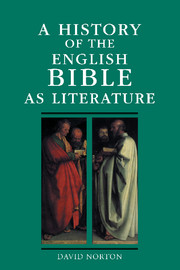Book contents
- Frontmatter
- Contents
- List of plates
- Preface
- List of abbreviations
- 1 Creators of English
- 2 From the Great Bible to the Rheims-Douai Bible: arguments about language
- 3 The King James Bible
- 4 Literary implications of Bible presentation
- 5 The struggle for acceptance
- 6 The Psalter in verse and poetry
- 7 ‘The eloquentest books in the world’
- 8 Writers and the Bible 1: Milton and Bunyan
- 9 The early eighteenth century and the King James Bible
- 10 Mid-century
- 11 The critical rise of the King James Bible
- 12 Writers and the Bible 2: the Romantics
- 13 Literary discussion to mid-Victorian times
- 14 The Revised Version
- 15 ‘The Bible as literature’
- 16 The later reputation of the King James Bible
- 17 The New English Bible
- Bibliography
- General Index
- Biblical Index
7 - ‘The eloquentest books in the world’
Published online by Cambridge University Press: 05 June 2012
- Frontmatter
- Contents
- List of plates
- Preface
- List of abbreviations
- 1 Creators of English
- 2 From the Great Bible to the Rheims-Douai Bible: arguments about language
- 3 The King James Bible
- 4 Literary implications of Bible presentation
- 5 The struggle for acceptance
- 6 The Psalter in verse and poetry
- 7 ‘The eloquentest books in the world’
- 8 Writers and the Bible 1: Milton and Bunyan
- 9 The early eighteenth century and the King James Bible
- 10 Mid-century
- 11 The critical rise of the King James Bible
- 12 Writers and the Bible 2: the Romantics
- 13 Literary discussion to mid-Victorian times
- 14 The Revised Version
- 15 ‘The Bible as literature’
- 16 The later reputation of the King James Bible
- 17 The New English Bible
- Bibliography
- General Index
- Biblical Index
Summary
THE ELOQUENT BIBLE
Thomas Becon and ‘the glorious triumph of God's most blessed word’
Another facet of the Bible as literature needs to be followed through the sixteenth and seventeenth centuries, the development of ideas of the eloquence of the Scriptures (the Scriptures rather than the English Bible). These ideas also have a history that goes far back into antiquity; moreover, they developed in England with considerable influence from Europe. So to begin with the popular and voluminous Thomas Becon (?1512–67) is to start in the middle of a ride with blinkers on.
Becon describes himself as one of little talent who has therefore ‘not attempted matters of high knowledge’ but rather sought to teach the people. Like so many Protestants, he had a dual sense of God's word (though it might be better to think of it as triple, since Christ is so often called the word, as in the second of the Thirty-nine Articles of the Church of England (1562)). As well as the Bible, the word is ‘the law of the spirit written in the heart of the faithful’ (III: fol. 392r). This definition comes in a short piece, ‘The diversity between God‘s word and man's invention’, which well illustrates the character of his work. It consists of 41 absolute contrasts, some of which seem to describe ‘the law of the spirit’ and others the Bible. Similarly, ‘man's invention’ refers primarily, as the preface makes clear, to the traditions and doctrines of the Catholics, and yet also to secular literature including ‘the writings of the heathen philosophers’ (III: fol. 389r). Becon likes to work in large, resounding generalities.
- Type
- Chapter
- Information
- A History of the English Bible as Literature , pp. 140 - 173Publisher: Cambridge University PressPrint publication year: 2000



